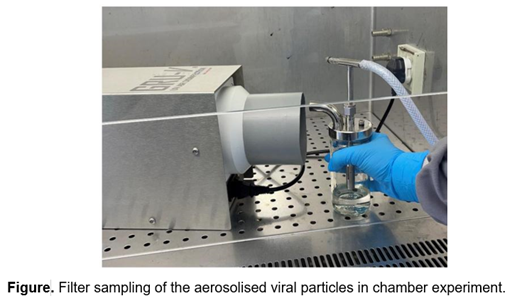Grant awarded: £24,988.75
PI: Ahbishek Tiwary
Funder: UKRI
This is a proof-of-concept study towards developing a methodological capacity to assess the efficacy of an innovative air treatment unit (henceforth the EnHANCE system) in enclosed spaces. It is motivated by its potential deployment in public transport microenvironments such as lounge, lifts and stairways to simultaneously control pathogens and improve the air quality. The first part of the project mainly focused on developing a measurement protocol for the EnHANCE system (and systems like it). It involved performance testing of the system through an inlet-outlet monitoring scheme in controlled lab environment under three different ventilation scenarios (closed room, closed room with in-flow through a vent, open room with a cross-flow); two identical portable equipment were used for monitoring air pollutants – particulate matter (PM10 and PM2.5), total volatile organic carbon (TVOC, including benzene, toluene) and the microenvironment (temperature and humidity).
In the next step, the performance of the system for reduction in virus loading was evaluated in a controlled virology lab. Human coronavirus (HCoV)-OC43 and mouse norovirus 1 (MNV-1) were used as model enveloped and non-enveloped viruses; aerosolised air samples were collected on the upstream and downstream locations in a control chamber, and their infectivity (TCID50) and viral genomes (qPCR) was measured.
The project demonstrated that the EnHANCE system can offer a robust, continuous intervention for simultaneously reducing both air pollution and pathogen loading, with PM2.5 reduction potential of over 97% and TVOC of up to 95%. Based on the efficacy evaluations, the system is deemed suitable for its deployment in a transport environment to reduce exposure in a constrained space, such as waiting lounge and lifts. We reckon full-scale deployment of the EnHANCE system in such locations would serve two-fold purpose – first, provide a control measure in any future pandemic preparation; second, offer an active health intervention at public transport facilities, specifically alleviating the health risk posed from air pollution and pathogen exposure to vulnerable population, who tend to use these facilities more frequently.

Funder: TRANSITION-BioAirNet Discovery & Innovation grant, co-funded by the UKRI TRANSITION Clean Air Network (ref. NE/V002449/1, led by the University of Birmingham) and BioAirNet (ref. NE/V002171/1, led by Cranfield University) (2023)
Key researchers: Abhishek Tiwary, Andrew Reeves (School of Engineering and Sustainable Development), Maitreyi Shivkumar (School of Pharmacy)